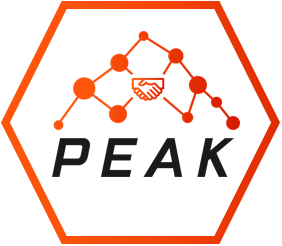Publikationen
Projektergebnisse im Rahmen von PEAK werden hier in Form von wissenschaftlichen Beiträgen und Pressemitteilungen veröffentlicht.
Wissenschaftliche Veröffentlichungen

Integrating Peer-to-Peer Energy Trading and Flexibility Market With Self-Sovereign Identity for Decentralized Energy Dispatch and Congestion Management
Autoren
Maximilian Kilthau, Martin Asman, Alexandra Karmann, Ghayathri Suriyamoorthy, Jan-Philip Beck, Vincenz Regener, Christian Derksen, Nils Loose, Moritz Volkmann, Shashank Tripathi, Felix Gehlhoff, Kamil Korotkiewicz, Philippe Steinbusch, Volker Skwarek, Markus Zdrallek, Alexander Fay
Publikation
in IEEE Access, vol. 11, pp. 145395-145420, 2023
Abstract
Addressing the trends of digitalization, decentralization, democratization, and decarbonization,
local peer-to-peer (P2P) markets have the potential to significantly accelerate decarbonization at the
communal level. However, due to an increase in the number of energy consumers, such as electric vehicles or
heat pumps, grid congestion can occur since actual low-voltage grids are not designed to transmit large loads.
This paper introduces a novel concept for a platform to combine the advantages of P2P trading with the need
for secure, automated low-voltage grid control, ensuring effective congestion management. Therefore, a dual
local energy market has been developed, comprising a P2P energy market and a flexibility market with the
latter ensures preventively managing congestion. Furthermore, mechanisms exist to provide curative, realtime congestion management. Additionally, the platform empowers prosumers, i.e. end users that produce
and consume electrical energy, with intelligent market strategies to maximize their financial outcomes by
participating in both markets. To provide a secure trading mechanism, the novel concept of Self-SovereignIdentity is integrated into the platform. The platform is based on a multi-agent-system developed using
the Java Development Environment (JADE) in conjunction with the Energy Option Model (EOM) for the
effective modelling of energy systems. Tested in a smart grid laboratory at the University of Wuppertal, the
platform provides financial gains for prosumers and effectively manages current- and voltage-related grid
congestions.

Energiegemeinschaften und die Rolle des Prosumers - Ökonomische und regulatorische Überlegungen zu verschiedenen Umsetzungsmöglichkeiten
Autoren
Alexander Bogensperger, Vincenz Regener
Publikation
Diskussionspapier, Online-Veröffentlichung am 07.06.2023, Herausgeber: FfE, München
Abstract
Energiegemeinschaften versprechen neue Möglichkeiten, Bürger:innen für die Energiewende zu gewinnen und neue Flexibilitäten für eine Reduktion der Netzausbaukosten zu erschließen. Eine Form dieser Energiegemeinschaften, die insbesondere durch das Aufkommen neuer Technologien wie Blockchain in den Fokus gerückt sind, sind lokale Energiemärkte. Die Idee dahinter ist, dass Erzeugung und Verbrauch direkt vor Ort auf einem lokalen Markt gehandelt werden. In der Theorie ließen sich durch den direkten Peer-to-peer-Handel unter Nachbarn auch die Aufschläge und Ineffizienzen umgehen, die durch die Vermarktungskette über die Strombörse entstehen.
Und obwohl in der RED II und der IEMD die Europäische Union die Realisierung solcher Energiegemeinschaften fordert, stehen diese Projekte in Deutschland noch enormen regulatorischen Hürden gegenüber.
Mit dem Diskussionspapier „Energiegemeinschaften und die Rolle des Prosumers“ aus dem Projekt PEAK (FKZ: 03E16035F) wollen wir die notwendigen Prozesse und Verpflichtungen beleuchten, die Prosumer bei Teilnahme eines lokalen Energiemarkts erfüllen müssen und welche Kosten dabei für sie entstehen. Durch eine Gegenüberstellung mit den möglichen Effizienzgewinnen durch den Verzicht auf Intermediäre versuchen wir die finanzielle Attraktivität solcher Marktmodelle für verschiedene Gruppen von Prosumern herauszuarbeiten.
Außerdem skizzieren wir eine Möglichkeit, die wesentlichen Vorteile von Energiegemeinschaften zu nutzen, die bereits mit der heutigen Regulatorik konform ist und liefern Handlungsempfehlungen, um die regulatorischen und technischen Voraussetzungen für Energiegemeinschaften in Deutschland signifikant zu verbessern.

Privacy in Local Energy Markets: A Framework for a Self-Sovereign Identity based P2P-Trading Authentication System
Autoren
Moritz Volkmann, Shashank Shekher Tripathi, Sascha Kaven, Carsten Frank, Volker Skwarek
Publikation
2023 IEEE 21st International Conference on Industrial Informatics (INDIN)
Abstract
The energy sector is part of the critical infrastructure in modern society where security and privacy concerns of the customers of this infrastructure have been well studied and addressed. In the classical power grid, consumers are being supplied by a major power grid operator who has been government-sanctioned and therefore has to adhere to privacy and security guidelines. In recent years, however, with the shift to the usage of renewable energies, new concepts for the trading of energy flexibilities have emerged, that enable consumers with their own energy production to sell their spare energy back to the market. While reducing the load from the grid operators by enabling peer-to-peer trading between grid participants, this comes with new privacy concerns, which have to be addressed and regulated.This work proposes a conceptual framework based on Self-Sovereign Identity (SSI) to establish a secure and private peer-to-peer trading system between energy market participants, which provides the participants control over their own digital identity and what data these participants want to share with peers. Furthermore, this work discusses the proposal’s effects and implications on system security and user privacy.

A systematic review of modeling approaches for flexible energy resources
Autoren
Lukas Peter Wagner, Lasse Matthias Reinpold, Maximilian Kilthau, Alexander Fay
Publikation
2023, Renewable and Sustainable Energy Reviews, Volume 184, 113541, ISSN 1364-0321
Abstract
Due to increasing amounts of energy being supplied by intermittent renewable energy sources, future energy systems need to be able to react flexibly to sudden changes. To address this challenge, a large body of research is devoted to improving the utilization of energy flexibility of various types of energy resources on the supply and demand side. This is commonly done by applying mathematical models. The objective of this paper is to review such models and identify common modeling approaches used to quantify and optimize the use of flexible energy resources. The literature review is conducted systematically, encompassing 215 publications that feature 694 models of different energy resources. The main distinction of this work, in comparison to other reviews on the topic of energy flexibility lies in its focus on the mathematical formulation of models of energy resources and the quantification of the models’ level of detail. The aim is to identify common modeling approaches and the corresponding research problems they address. The review shows that the majority of research efforts are directed towards the management and optimization of distributed energy resources. The most commonly employed modeling approach involves abstract black-box models with limited levels of detail. Linear programming and meta-heuristics are frequently used to optimize energy flexibility. A critical reflection of the current common practice is conducted and recommendations for future research are formulated.

Metric for Analysing Cooperative and Competitive Algorithms for Distributed Frequency Control in Microgrids
Autoren
Maximilian Kilthau, Alexandra Karmann, Christian Derksen, Alexander Fay
Publikation
2023 27th International Conference on Electricity Distribution (CIRED)
Abstract
To control the high amount of decentral generation and consumption, decentralized energy control approaches are necessary to handle computational power re-strictions, robustness requirements and provide scalabil-ity. For this, structures like microgrids are under devel-opment, where energy systems can be controlled decen-trally, using decentral optimization algorithms. Here, optimization algorithms can be classified into coopera-tive and competitive algorithms that – for each – provide individual benefits. To compare cooperative as well as competitive algorithms that control the tertiary frequen-cy, the paper proposes the usage of a metric. As a practi-cal use case, candidates of both classes of algorithms are implemented and analysed.

Metrics for the Validation of Agent-Based Local Flexibility Markets
Autoren
Alexandra Karmann, Maximilian Kilthau, Jan-Philip Beck, Christian Derksen, Kamil Korotkiewicz, Martin Asman, Alexander Fay
Publikation
2023 27th International Conference on Electricity Distribution (CIRED)
Abstract
This paper focuses on agent-based local peer-to-peer flexibility markets with congestion management from a DSO-perspective. Technical key performance indicators are defined to validate the application of flexibility markets. A simulation is performed, evaluating the state of a low-voltage grid in two setups, with and without a flexibility market. The evaluation of the key performance indicators proves that flexibility markets can preventively reduce grid congestions and thus provide an economic potential for DSOs.

Design choices in peer-to-peer energy markets with active network management
Autoren
Vincenz Regener, Gisela Römmelt, Andreas Zeiselmair, Louisa Wasmeier, Alexander Bogensperger
Publikation
2022 IET Special Issue: Blockchain technologies empowering peer-to-peer trading in multi-energy systems
Abstract
Due to the growing number of Distributed Energy Resources and new electrical loads at the sectoral contact points, novel organisational forms such as Local Energy Markets arise to deal with increasing complexity in the energy system. However, these markets are radically different from traditional energy markets, as they often allow individual prosumers to trade with each other via a peer-to-peer scheme. To guarantee tamper-proof settlement, an increasing number of these markets feature a distributed ledger technology.This paper analyses different design variants of peer-to-peer markets, focusing specifically on the allocation mechanism under network constraints as these mechanisms constitute the core component of a market design. We assess these designs concerning user acceptance, economic performance, practicability, and their ability to relieve grid congestion. Further key performance indicators also cover communal revenues or welfare distribution. For this purpose, we developed an agent-based simulation framework, which builds on data from three German reference municipalities derived from a novel clustering approach. Besides a consolidated presentation of the results, we highlight current implementation obstacles and identify promising concepts for further research.

Elicitation and Analysis of Requirements for a Peer-to-Peer Energy Market
Autoren
Maximilian Kilthau, Vincenz Regener, Andreas Zeiselmair,
Jan-Philip Beck
Publikation
2022 IEEE 16th International Conference on Compatibility, Power Electronics, and Power Engineering (CPE-POWERENG)
Abstract
By addressing the trends of digitalization, decentralization, democratization, and decarbonization, local Peer-to-Peer (P2P) markets have the potential to significantly accelerate decarbonization at the communal level. In addition to prosumers and consumers, other stakeholders are involved in P2P trading as well. To consider the individual stakeholder interests, we extended and refined an existing methodology for establishing and analyzing the requirements for a local energy market. Thus, the paper describes the extension and application of the first part of the Development approach for Decentralized Control Systems (2DECS). According to 2DECS, we followed the four artifacts of requirements elicitation: the derivation of relevant User Stories, the “Definitions of Done”, creation of Story Cards, and the establishment of Acceptance Test Requirements. In addition, we rated the individual interests of the market participants based on their potential for conflict.
Pressemitteilungen

"Viele Peer-to-Peer-Ansätze scheitern an der Regulierung"
3 Fragen an Maximilian Kilthau, HSU HH
Hamburg (energate) – In dem Forschungsprojekt Peak entwickeln Partner aus Wissenschaft und Energiebranche eine digitale Handelsplattform für Prosumer
Veröffentlicht am
15. August 2023

Lieber Nachbar, hätten Sie noch etwas
Strom für mich?
Heute können viele Menschen eigenen Strom erzeugen. Durch Tauschbörsen, unter anderem auf Blockchain-Basis, sollen alle etwas davon haben.
Veröffentlicht am
24. August 2021
© 2023 PEAK-Plattform
